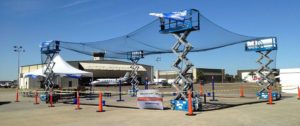 A top-rated aeronautics university hopes that the growth of crowdfunding success for drone startups may translate into success for drone training and education.
A top-rated aeronautics university hopes that the growth of crowdfunding success for drone startups may translate into success for drone training and education.
Florida-based Embry-Riddle Aeronautical University, which has been offering UAV degrees since 2011, launched a crowdfunding project this week to develop a free drone comparison and buying guide.
“Many new buyers are unfamiliar with critical concepts of aviation and may not completely understand what options best meet their needs,” the university’s funding page states.
The university hopes to test the capabilities of a diverse array of drones and is seeking $10,000 toward building a comprehensive data guide.
“We hope to reach a large audience with both the campaign and the resulting guide to help promote detailed consumer platform consideration and comparison, prior to their purchase and use,” said Brent A. Terwilliger, Embry-Riddle’s Master of Science in Unmanned Systems program chair.
“Additionally, we plan to use these platforms to exhibit responsible and appropriate use with our students and the general public through demonstration, outreach, and research activities,” he added.
Embry-Riddle has already established its name as a top UAV program. In July, SuccessfulStudent.org, an online source for students to research colleges and fields of study, named the university its top pick among the “15 Best Drone Training Colleges in America.”
So far, the university has already gathered and analyzed metrics of 500 drone platforms, acquired seven sUAS platforms, developed a rating system for sUAS platforms and begun a draft for the proposed guide.
“To create this free public resource, the [University] needs funds to buy a variety of sUAS to test and analyze, ranging in price from $349 to $1,369,” the university’s funding page states. “Several faculty members, along with graduate and undergraduate students, will examine a number of popular sUAS platforms and provide reviews relating to key areas important to a first-time operator — including quality of construction, ease of operation, cost, accuracy of advertised capability and user support.”
“We plan to use these platforms to exhibit responsible and appropriate use with our students and the general public through demonstration, outreach, and research activities,” Terwilliger said. “This campaign and development of the guide will provide an opportunity for our students to apply what they have learned in the classroom, perform meaningful research, and build critically needed experience, further preparing them to contribute to the promotion and success of this field.”
Jason is a longstanding contributor to DroneLife with an avid interest in all things tech. He focuses on anti-drone technologies and the public safety sector; police, fire, and search and rescue.
Beginning his career as a journalist in 1996, Jason has since written and edited thousands of engaging news articles, blog posts, press releases and online content.
Email Jason
TWITTER:@JasonPReagan
Subscribe to DroneLife here.







Leave a Reply